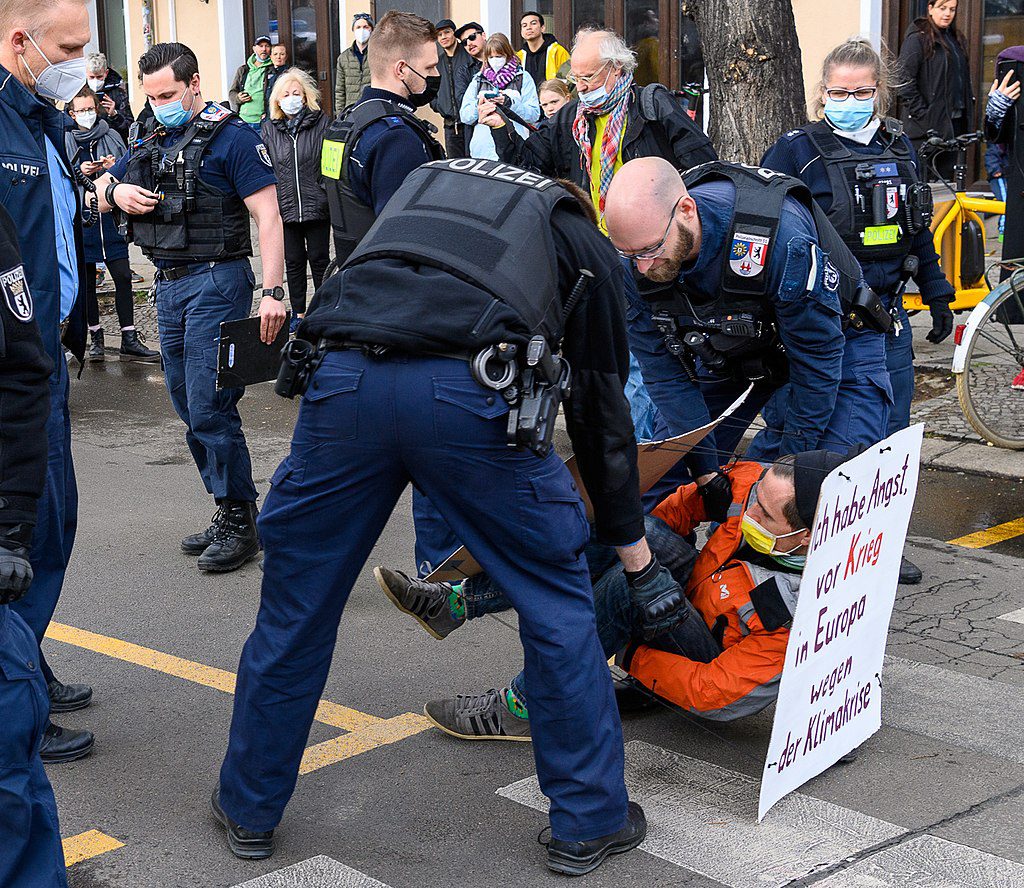This autumn, all over Europe, actions by ‘climate activists’ are taking place that have not only broken the law but also involved vandalism and physical violence. At the National Gallery in London, two women threw soup over a Vincent Van Gogh painting; at a German museum other activists smeared a Claude Monet painting with mashed potato; and, of course, there was Belgian repeat activist Wouter Mouton, who last summer struck both in Bruges, on a Van Eyck work, and in The Hague, where the target was Vermeer’s masterpiece, Girl with a Pearl Earring. In Belgium, he got off with a €1,000 bill, but in the Netherlands he received a one-month effective jail sentence. In response to the latter, Extinction Rebellion, one of the climate action groups, threatened a “wave of actions.”
The activists claim not to use violence, but smearing a work of art, even if it is behind glass, is vandalism, ignoring the level of nuisance involved. So, in a joint statement, dozens of directors of leading museums around the world, including the Louvre in Paris, the Prado in Madrid, the Guggenheim in New York and the Uffizi in Florence, called on the climate vandals to stop this. They state they are “deeply shocked … by the risky actions that endanger art” and add that “activists underestimate the fragility of these irreplaceable objects.”
Crossing the line of violence
Meanwhile, the line of violence has already been crossed. In Portugal, climate fanatics stormed a government building, shouting for the resignation of the economy minister who had to flee the building. In German media, far-left climate extremist Tadzio Müller openly stated that it is “our damned duty” to blow up pipelines, advocating green terrorism, even though he said that murder was “politically counterproductive.” His Swedish kindred spirit Andreas Malm, noted Professor at Lund University, albeit in ‘human ecology,’ even drew up a manual entitled How to Blow Up a Pipeline, which prescribes: “Damage and destroy new devices that emit CO₂. Put them out of operation, take them apart, demolish them, burn them, blow them up. Let the capitalists who continue to invest in fire know that their properties will be destroyed.” Malm is not alone. Luisa Neubauer, the German equivalent of Greta Thunberg, recently posted on Instagram about how she and her allies planned to “blow up pipelines,” something she later tried to dismiss as a joke.
As a result of an action by a protester from Just Stop Oil, another of the notorious groups, a truck caused a crash on a UK motorway, injuring a policeman, not long after an accident in the UK—due to a traffic jam caused by ‘climate blockades’—had claimed the lives of two women, including a 40-year-old doctor. In Berlin, an ambulance on its way to attend to a seriously injured cyclist became stuck in traffic jams due to such obstructions on public roads.
Despite all this, climate action continues to enjoy support from some media outlets. In Germany, the government-funded German broadcaster WDR even listed the pros and cons of vandalising art, with the list of benefits being twice as long.
Greenpeace openly supports the actions, pays the lawyers’ bills afterwards, and also provides space, materials, and know-how. Direct funding comes from the US-based Climate Emergency Fund (CEF), which has already spent $5 million on this this year.
Political support
The actions also enjoy support at the political level. The all-in-all very limited criticism of recent activist actions by the Belgian Prime Minister during his speech at the COP 27 ‘climate summit’ in Egypt was , strongly criticised by the co-president of the Flemish Greens, Nadia Naji. Climate alarmism has deeply penetrated the highest policy levels in Europe. For instance, the chief of cabinet of the European commissioner responsible for climate policy, Frans Timmermans, comes from the stable of Greenpeace: the chief of staff, Diederik Samsom, by his own admission, was himself arrested 10 times by police in the past, something about which he has expressed no regrets.
Belgian Energy Minister Tinne Van der Straeten also gave a particularly alarmist interview from Egypt. She stated: “We are in the last decade to do something about climate change. We are in climate hell, and we should not just tell people that during the two weeks of the climate conference.”
Apart from the fact that this kind of climate hysteria is probably rather counterproductive for the cause of climate activists and 2000 scientists— who already stated in 2007 that there are “ten years left to avoid catastrophe”— official reports also no longer state that it is all that urgent. Professor Gerard Govers, vice-rector of KU Leuven University’s science department, says: “The climate doomsday scenarios are now being abandoned en masse,” referring to new projections on global warming from the U.N. Environment Programme and the International Energy Agency. According to renowned Danish researcher Bjorn Lomborg, climate change is indeed a challenge, but the hysteria is unjustified. He says: “We are incessantly told about disasters, whether the latest heat wave, flood, wildfire, or storm. Yet, the data overwhelmingly shows that over the last century, people have become much safer from all these weather events.”
Publicist Andrew Hammel warns that it is important to draw lessons from the German far-Left terror of the 1970s, where far-left activists then “never enjoyed mainstream support but were aided by an underground network of sympathisers, usually far-left journalists, activists, lawyers and professors,” which was vital to their radicalisation. Politicians or opinion makers who do not condemn undemocratic climate vandalism thus bear a great responsibility.
When in trouble, double
Meanwhile, current climate policies are only getting tighter and tighter. For instance, at the COP27 conference in Egypt, several industrialised countries including Belgium, Germany, Denmark and Austria, even agreed to the idea of reparations for ‘climate damages.’ Belgium already pledged €25 million to Mozambique—just as the first tanker departed from the African country with LNG gas, a fossil fuel, that is destined to help solve Europe’s gas shortage. The climate hypocrisy really knows no limit.
It should also come as no surprise that the European Commission also fully supports further tightening of climate policy. Climate commissioner Timmermans announced in Egypt that the EU’s climate targets by 2030 “can now be increased to 57 per cent,” this while the European Emissions Trading Scheme ETS—effectively a European climate tax—is being extended to more and more sectors.
Fortunately, the harsh reality seems to be quietly creeping in on EU member states after all. European Commission President Ursula von der Leyen did go on the alarmist-religious track during COP27, stating, “Let’s not take the highway to hell … but earn our clean ticket to heaven.” The Czech presidency of the EU Council struck a very different tone through Jozef Síkela, the Czech energy minister, who advocated “looking at things from the point of view of industry,” which is just today under severe pressure in Europe due to a shortage of fossil fuels, a direct consequence of EU and member state policies to phase them out.
The rest of the world, too, seems to be increasingly ignoring European climate zealots’ prohibitively expensive ambition by 2050 for ‘net zero’—when the amount of greenhouse gases we add to the atmosphere is no more than the amount taken away. According to the head of the EU’s COP27 delegation, Jacob Werksman, EU negotiators were disappointed that other countries had “not come up with more convincing strategies for achieving ‘net zero’ by mid-century.”
Perhaps the winter cold and accompanying energy bills could cool down the overheated climate activists and their minions at the policy level.






